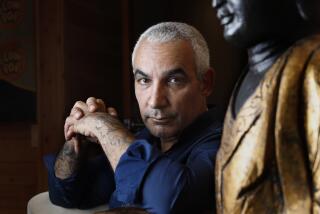Total Mounts to $10 Million : Raiders Hit With Another $5 Million in Klein Case
- Share via
Al Davis and the Los Angeles Raiders are .000 for 1987--and they won’t soon forget the magnitude of the year’s first loss.
A San Diego County Superior Court jury Thursday awarded another $5-million verdict to former San Diego Chargers owner Eugene Klein in his lawsuit accusing Davis and the Raiders of malicious prosecution.
The punitive damage award, piled atop the $5-million compensatory verdict the same jury imposed on Davis and the Raiders last month, leaves the maverick Los Angeles sports magnate $10 million in the hole to the outspoken Klein in their acrimonious, decade-long rivalry.
Klein, who sold the Chargers in 1984, claimed that Davis had maliciously singled him out as a defendant in the Raiders’ landmark, 1981 antitrust lawsuit against the National Football League. Klein accused the Raiders of being responsible for the heart attack he suffered on the witness stand during the trial of the antitrust case in May, 1982.
The Raiders won that suit, gaining the right to move from Oakland to Los Angeles, and Davis’ lawyers insisted in the San Diego case that the antitrust victory over the Chargers and the other NFL teams demonstrated that they were justified in having named Klein as a defendant.
But after two extraordinary months of trial, in which a galaxy of sports celebrities and high-powered antitrust specialists paraded into Judge Gilbert Harelson’s court, the jury cast its votes--twice--for Klein.
The multimillionaire businessman, who turned 66 Thursday, said Davis got exactly what he deserved.
“This was done with a view to teaching someone who has been a bully all his life--who has bullied people and pushed people around and has supreme arrogance--that you cannot get away with malicious prosecution,” Klein said in a telephone interview from his Rancho Mirage retreat. “There comes a time you have to be stopped.”
Raiders’ attorney Jeff Birren called the verdict “an absolute, unmitigated disgrace.” Former San Francisco Mayor Joseph Alioto, who led Davis’ defense team, said he would ask Harelson to set aside the jury’s decision and enter a judgment in favor of the Raiders.
He blamed the verdict on the hometown bias of a jury of San Diegans.
“This verdict is the result of local prejudice and passion,” he said. “We do not believe this verdict will stand.”
Birren said he was unable to predict what, if any, effect the $10 million in judgments would have on the Raiders’ ownership arrangements, or on Davis’ personal finances, if they are not overturned.
Davis owns 28% of the team--a share worth from $18.2 million to $19.6 million--and has additional assets worth under $1 million, according to financial estimates used in court.
The jury directed that Davis personally pay $1.4 million of Thursday’s punitive damage verdict. His 28% share of the remaining $3.6 million punitive verdict against the Raiders would be slightly more than $1 million.
Normally, the Raiders’ liability insurers would cover the jury’s initial, $5-million compensatory damages verdict. But the team’s insurance company filed a lawsuit earlier this week in U.S. District Court in Los Angeles seeking to be relieved of any responsibility for Davis and the Raiders’ action in the case. If the insurance company prevails, Davis and the other owners could be forced to pay the entire $10 million in judgments.
But Birren said he was confident the verdict would be thrown out and that Klein would not have much opportunity to savor the jury’s $10-million birthday gift.
“It’s one of the best ones he’ll ever have,” Birren said. “He won’t have it for long, but it’s a helluva present.”
The Raiders’ attorneys say the case never should have gone to a jury--that Klein had no legal leg to stand on in his claim of malicious prosecution. They also allege that the jury’s initial verdict was tainted by Klein’s pledge on a radio talk show during the jury’s deliberations last month to give any money he collected to charity, after paying his legal fees.
Earlier this week, the Raiders’ lawyers sought a mistrial on the grounds that the jurors were confused during their December deliberations and had included a sum for punishment in their initial, compensatory verdict.
Alioto said that claim was given weight Thursday by juror Michael Phillips, the only member of the jury who agreed to talk to attorneys after the case.
Under questioning by Alioto in front of a group of reporters and photographers, Phillips conceded that he was confused about the jury’s responsibilities and had not realized there would be a second, punitive damage phase in the trial.
But Phillips, one of three jurors who voted against giving additional damages to Klein, nonetheless said the trial was a vindication of the jury system.
“When nine people can agree on something--and even though I did not agree--that seems to me to be a favorable test of what the justice system is about,” he said.
Klein also expressed his satisfaction with the workings of the courts.
“I’m very grateful we have a system where justice can prevail, even though it does take a little longer at times than you’d like it to take,” he said.
The trial ended with a final dollop of the gridiron flavor that permeated the vitriolic case.
After the jury was dismissed, Harelson returned to the bench blowing a whistle and wearing a gift the jurors had given him--a black-and-white striped referee’s jersey.
The judge, who retired early this month but agreed to finish hearing the case, stood behind the bench and announced he was engaging in his final act as a judge: He dropped a yellow penalty flag.
Birren said Harelson’s escapade underlined the absurdity of the case.
“This whole thing has been Never-Never-Land to me,” he sighed.
More to Read
Go beyond the scoreboard
Get the latest on L.A.'s teams in the daily Sports Report newsletter.
You may occasionally receive promotional content from the Los Angeles Times.










